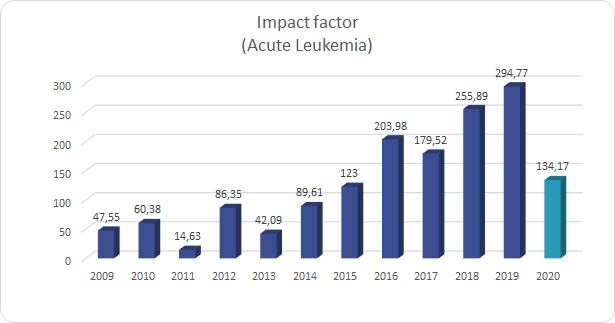Scientific report 2020 of the Acute Leukemia Working Party (ALWP)

Major achievements
This year has been incredibly difficult for everyone, and I am so grateful for your continuous support. COVID-19 may keep us in its grips for a little while longer, but the news of a vaccine, the introduction of more advanced testing, offer us hope of a return to a certain norm. Immediately after the start of the pandemic, the ALWP leadership and staff have worked hard to help our community during these hard times. Thanks to a thorough evaluation, we were able to deliver some practical guidelines for the management of patients with acute leukemia during the COVID-19 outbreak. Also, we took immediate action to continue our studies and keep the members connected through different digital tools. Thanks to the booming use of haplo-identical donors, the number of HSCT procedures for patients with acute leukemia is continuously growing. This increase is accompanied by improving results, due to both lower risk of relapse (maintenance therapy post HSCT) and decreased non-relapse mortality. In 2020, and like in previous years, the ALWP published a high number of papers. We have also launched many new studies, especially a major initiative aiming to collect next-generation sequencing (NGS) data and use of novel drugs. Molecularly directed treatment options represent a significant advance in the field and they highlight the importance of NGS as a backbone of the clinical decision-making process, both at diagnosis and at time of relapse. Today, NGS allows for assessing the unique clonal hierarchy of an individual patient, leading to tailored treatment approaches, thereby providing improved outcomes. Identifying «druggable» mutations paves the way for the use of novel targeted therapies. This may represent an attractive bridging approach for reinduction before HSCT. Collecting such data will allow the generation of new knowledge to further advance the field. We would highly appreciate it if you could help by contributing to this important new study. All of these activities are possible thanks to all EBMT members who report their data voluntarily. Thank you again for your continued loyalty and this year, we honestly could not have done it without you. It is a true privilege and honor to lead the ALWP and serve EBMT.
Principal research studies
- Analysis of the role of haploidentical donors in different disease settings
- Prognostic impact of measurable residual disease (MRD) in the transplant setting for acute leukaemia
- Role of the different agents to treat and prevent relapse post HSCT for acute leukaemia
- Value of NGS data to predict transplant outcome
- Building a consensus guideline for the analysis and use of MRD in leukaemia patients candidate to transplant
Key publications

| 2015 | 2016 | 2017 | 2018 | 2019 | 2020 | |
|---|---|---|---|---|---|---|
| Oral presentations | 22 | 30 | 39 | 28 | 24 | 17 |
| Poster presentations | 15 | 19 | 23 | 18 | 17 | 12 |
| International educational events | 3 | 2 | 2 | 3 | 1 | 2 |
Major educational courses
Two educational and business meetings [Virtual].

